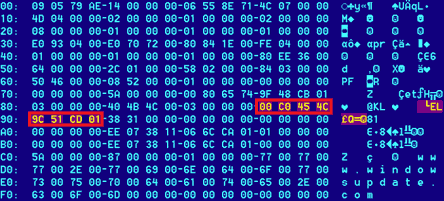|

Several layers deep into one of Stuxnet’s configuration
blocks, an 8-byte variable outlined in red appears to be the date
(6/24/2012) that the program de-activated itself from further
replicating onto USB thumb drives worldwide. Photo: securelist.com
 n
July 12, 2016, shortly after the arbitral tribunal ruled in favor of the
Philippines, internet access for many Filipinos was inexplicably lost.
And for several days thereafter, once stable online access fluctuated on
and off to the consternation of thousands of Pinoy internet users who
found it difficult to go online. Coincidence? Maybe, but the timing
seemed highly unusual. n
July 12, 2016, shortly after the arbitral tribunal ruled in favor of the
Philippines, internet access for many Filipinos was inexplicably lost.
And for several days thereafter, once stable online access fluctuated on
and off to the consternation of thousands of Pinoy internet users who
found it difficult to go online. Coincidence? Maybe, but the timing
seemed highly unusual.
For readers who have
seen the newly released documentary, Zero Days, they understand
that what Filipinos experienced last July was more likely a cyber attack
than just a coincidence. In the documentary, filmmaker Alex Gibney
depicts how the CIA and Israel's Mossad intelligence services teamed up
to create the Stuxnet worm, a cyber weapon that was used against Iran's
nuclear weapons development effort. A highly sophisticated piece of
malware, Stuxnet spread out over the internet to eventually find it's
way into computers used in Iran's nuclear program. The cyber code clandestinely caused Iranian centrifuges in Natanz to behave
erratically frustrating the country's efforts at enriching uranium and
thereby delaying Iran's efforts to develop a nuclear weapon. Many
Iranian scientists and engineers were fired from their jobs before their
government eventually figured out what was going on.
Since Stuxnet,
governments all over the world, including China, have been busy
developing their own cyber-warfare programs and countermeasures against
Stuxnet-like attacks. Unfortunately the Philippines appears to be so
behind-the-curve in this regard, we wouldn't know a cyber attack if it
was staring us in the face. But those in the know—aware of China's
highly advanced and extensive cyber-warfare program—find it
inconceivable that Chinese government hackers have not already
penetrated most levels of the Philippines' cyber infrastructure, and are
ready and able to bring it crashing down when told to do so. The
internet, cell phones, government communications, and military command
and control capabilities can all go "dark" at a moments notice.
Is the Duterte
Administration undermining the UN Arbitral Tribunal's decision?
In other fronts,
China does not even need to use sophisticated cyber-weapons against the
Philippines. According to detractors, the current administration's
apparent disregard for human rights plays right into China's hands. The
argument China will surely make against honoring the UN tribunal's
judgment against them in the South China Sea will be that the country
that brought the case against them—the Philippines, itself does not
adhere to UN human rights laws. These detractors further point out that
the extra-judicial killings of scores of Filipinos that President
Rodrigo Duterte appears to be cheering on, or at the very least
condoning, is causing many concerned individuals around the world to
raise their voices against such acts. When the Philippines refuses to
follow universally accepted principles like due process and an
individual's presumed innocence until proven guilty, it's protestations
against China's refusal to respect the Hague Arbitral Tribunal's
decision begin to ring hollow.

A woman cradles her husband, a suspected drug dealer, who
was killed by Philippine vigilante groups. Photo: Getty Images
Duterte's winning the
presidency is most likely a blessing as far as the Communist Chinese are
concerned. Not only does his administration show a shallow understanding
of the South China Sea issue, but the extra-judicial way with which
Duterte is waging his war on drugs significantly undermines the
Philippines' image as a law-abiding country.
Published
8/8/2016 |